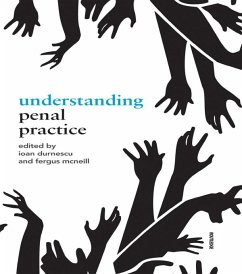
Understanding Penal Practice (eBook, ePUB)
Versandkostenfrei!
Sofort per Download lieferbar
45,95 €
inkl. MwSt.
Weitere Ausgaben:

PAYBACK Punkte
23 °P sammeln!
Criminological and penological scholarship has in recent years explored how and why institutions and systems of punishment change - and how and why these changes differ in different contexts. Important though these analyses are, this book focuses not so much on the changing nature of institutions and systems, but rather the changing nature of penal practice and practitionersBringing together leading researchers from around the world, this collection unites studies that aim to describe and critically analyse penal practice with studies that investigate its effectiveness and prescribe its future...
Criminological and penological scholarship has in recent years explored how and why institutions and systems of punishment change - and how and why these changes differ in different contexts. Important though these analyses are, this book focuses not so much on the changing nature of institutions and systems, but rather the changing nature of penal practice and practitioners
Bringing together leading researchers from around the world, this collection unites studies that aim to describe and critically analyse penal practice with studies that investigate its effectiveness and prescribe its future development. Reversing penology's usual preoccupation with the prison, the book focuses mainly on penal practice in the community (i.e. on probation, parole, offender supervision and 'community corrections').
The first part of the book focuses on understanding practice and practitioners, exploring how changing social, cultural, political, and organisational contexts influence practice, and how training, development, professional socialisation and other factors influence practitioners. The second part is concerned with how practitioners can be best supported to develop the skills and approaches that seem most likely to generate positive impacts. It contains accounts of new practice models and approaches, as well as reports of research projects seeking both to discover and to encourage effective practices.
This book explores internationally significant and cutting-edge theoretical and empirical work on the cultures, practices, roles and impacts of frontline practitioners in delivering penal sanctions. As such, it will be of interest to researchers in criminology, social work and social policy as well as correctional policy makers and those involved in community supervision.
Bringing together leading researchers from around the world, this collection unites studies that aim to describe and critically analyse penal practice with studies that investigate its effectiveness and prescribe its future development. Reversing penology's usual preoccupation with the prison, the book focuses mainly on penal practice in the community (i.e. on probation, parole, offender supervision and 'community corrections').
The first part of the book focuses on understanding practice and practitioners, exploring how changing social, cultural, political, and organisational contexts influence practice, and how training, development, professional socialisation and other factors influence practitioners. The second part is concerned with how practitioners can be best supported to develop the skills and approaches that seem most likely to generate positive impacts. It contains accounts of new practice models and approaches, as well as reports of research projects seeking both to discover and to encourage effective practices.
This book explores internationally significant and cutting-edge theoretical and empirical work on the cultures, practices, roles and impacts of frontline practitioners in delivering penal sanctions. As such, it will be of interest to researchers in criminology, social work and social policy as well as correctional policy makers and those involved in community supervision.
Dieser Download kann aus rechtlichen Gründen nur mit Rechnungsadresse in A, B, BG, CY, CZ, D, DK, EW, E, FIN, F, GR, HR, H, IRL, I, LT, L, LR, M, NL, PL, P, R, S, SLO, SK ausgeliefert werden.













